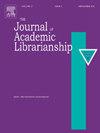Scaffolded information literacy and data literacy instruction within undergraduate science and engineering laboratory courses: A longitudinal assessment
IF 2.3
3区 管理学
Q2 INFORMATION SCIENCE & LIBRARY SCIENCE
引用次数: 0
Abstract
Science, technology, engineering, and mathematics (STEM) educators view science process skills like designing hypotheses, finding relevant technical information, synthesizing literature, analyzing data, visualizing results, and presenting findings as among the most valuable things a novice scientist can learn within the undergraduate curriculum. These skills overlap considerably with the competencies academic librarians categorize as information literacy skills: formulating research questions, assessing information needs, organizing information, synthesizing multiple sources, and communicating findings across multiple different media formats. We explored whether laboratory courses were an effective context for information and data literacy by scaffolding instructional interventions across three years of the undergraduate biomedical engineering (BME) curriculum. Utilizing a longitudinal pre-test/post-test design, we analyzed students' performance on multiple-choice and open-response assessments to evaluate their knowledge gains and retention over time. Our results indicated statistically significant improvements in students' ability to identify appropriate information sources and relevant library-licensed resources for different types of technical information. This suggests that science and engineering students can benefit from having librarians consistently offer guest-lectures throughout their academic careers, if these instructional interventions are customized to align with the specific tasks students will be expected to complete within their coursework. These findings also emphasize the importance of librarians and STEM educators collaborating to design instructional interventions together to create customized learning experiences that align with course objectives.
本科理工科实验课程中架式信息素养与数据素养教学:纵向评估
科学、技术、工程和数学(STEM)教育者认为科学过程技能,如设计假设、寻找相关技术信息、综合文献、分析数据、可视化结果和展示发现,是新手科学家可以在本科课程中学习的最有价值的东西之一。这些技能与学术图书馆员归类为信息素养技能的能力有很大的重叠:制定研究问题,评估信息需求,组织信息,综合多种来源,并通过多种不同的媒体格式传达发现。我们通过对三年本科生物医学工程(BME)课程的脚手架式教学干预,探讨了实验室课程是否是信息和数据素养的有效背景。利用纵向测试前/测试后设计,我们分析了学生在多项选择和开放式回答评估中的表现,以评估他们在一段时间内的知识收获和记忆。我们的研究结果表明,学生识别不同类型技术信息的适当信息源和相关图书馆许可资源的能力在统计上有显著提高。这表明理工科学生可以从图书馆员在他们的学术生涯中持续提供客座讲座中受益,如果这些教学干预是定制的,以配合学生在课程中需要完成的特定任务。这些发现还强调了图书馆员和STEM教育工作者合作设计教学干预措施的重要性,以创造符合课程目标的定制学习体验。
本文章由计算机程序翻译,如有差异,请以英文原文为准。
求助全文
约1分钟内获得全文
求助全文
来源期刊

Journal of Academic Librarianship
INFORMATION SCIENCE & LIBRARY SCIENCE-
CiteScore
5.30
自引率
15.40%
发文量
120
审稿时长
29 days
期刊介绍:
The Journal of Academic Librarianship, an international and refereed journal, publishes articles that focus on problems and issues germane to college and university libraries. JAL provides a forum for authors to present research findings and, where applicable, their practical applications and significance; analyze policies, practices, issues, and trends; speculate about the future of academic librarianship; present analytical bibliographic essays and philosophical treatises. JAL also brings to the attention of its readers information about hundreds of new and recently published books in library and information science, management, scholarly communication, and higher education. JAL, in addition, covers management and discipline-based software and information policy developments.
 求助内容:
求助内容: 应助结果提醒方式:
应助结果提醒方式:


